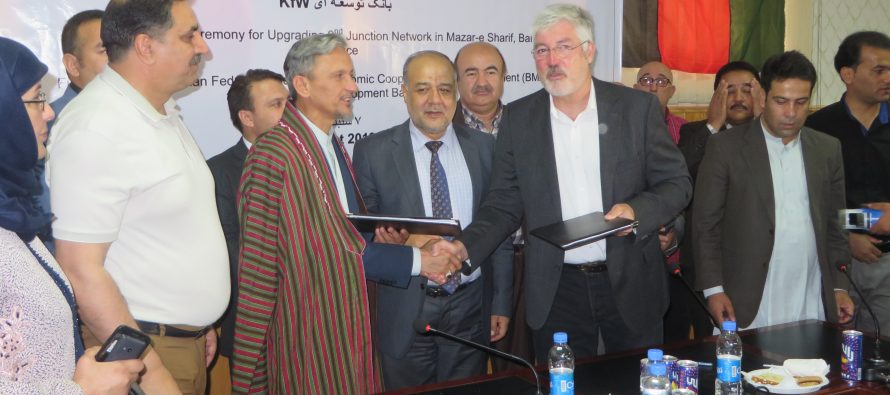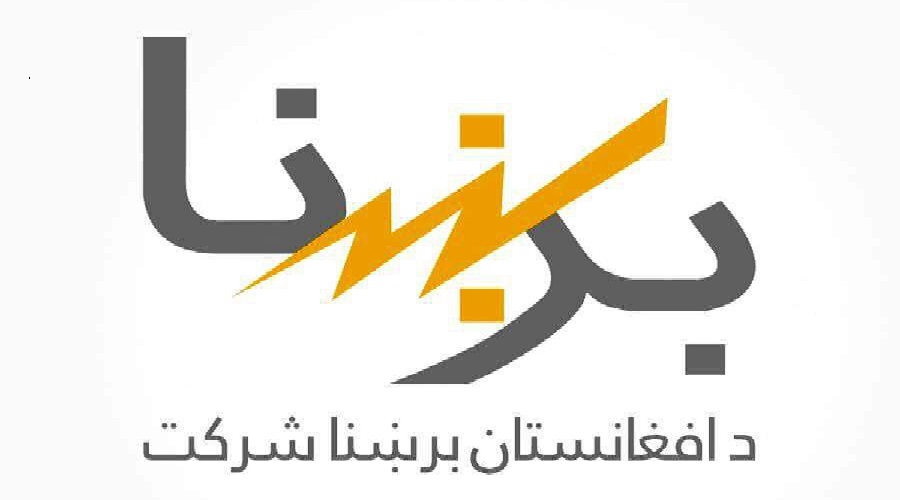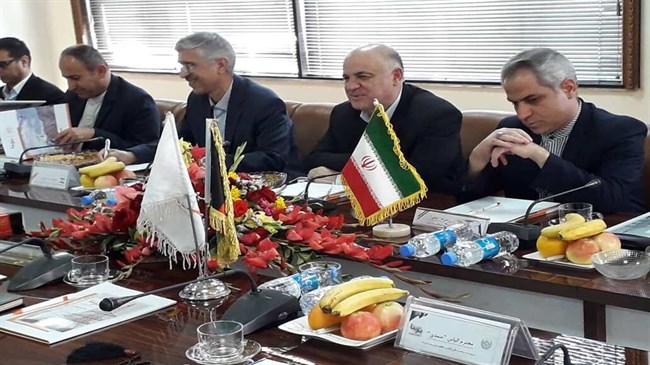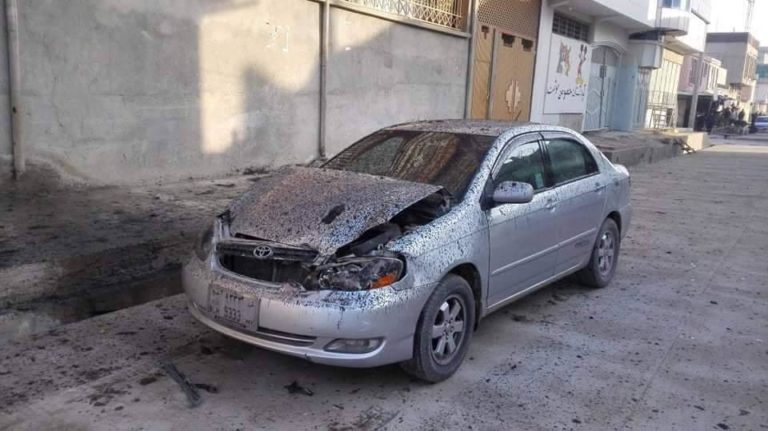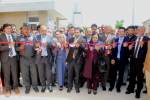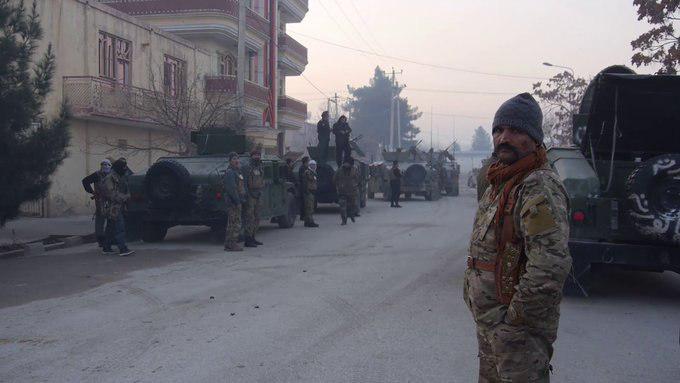Da Afghanistan Breshna Sherkat (DABS) in Balkh and the Afghan-German Cooperation signed the contract for upgrading a power supply network in the eastern part of Mazar-e Sharif.
Publish dateSunday 1 September 2019 - 00:58
Story Code : 190816
More than 20,000 residents in the neighborhood of Ali Chopan, Karte Wahadat, Bapa Padshah and Islam Abad will benefit from the improved energy infrastructure.
The Afghan-German Cooperation’s Regional Infrastructure Development Fund (RIDF) supported DABS in identifying the need for this project and is funding the project’s implementation at a total cost of about AFN 160 million.
Mohammad Bashir Tawhidi, Deputy Governor of Balkh said: “Providing electricity is a vital service for our people. The area is densely populated and deprived of electricity, so we hope this important project will tackle this issue.”
The network that currently supplies the four neighborhoods in the east of Mazar city is out-dated, in disarray and beyond repair. A modern 20-kilovolt network of 2.5 kilometres in length will replace it. In addition, fourteen transformer substations with a total capacity of 5.04 megavolt-ampere and a 31 kilometre-long low-voltage network will be installed. The transformer substations will distribute electricity to about 2,700 households as well as various public facilities, including schools, police stations, markets and health centres. This will vastly improve living conditions in the area and foster its economic and urban development.
Hamidullah Hamidi, Director of Balkh’s Electricity Department DABS, said DABS will closely monitor the construction activities.
RIDF will also offer on-the-job training, coaching and mentoring sessions for engineers and managers of DABS in Balkh during the project’s implementation. These activities aim at strengthening DABS’s ability to identify, manage, implement, operate and maintain similar projects independently in the future.
As agreed during the government consultations between Germany and Afghanistan in April 2019, Germany expects the Afghan government to meet its commitments in carrying out various reforms. This includes improving operation and maintenance of infrastructure measures in return for its investments. Therefore, the AFN 3.5 billion of agreed funding in 2019 are conditional on carrying out measures ensuring the longevity of existing and planned infrastructure projects.
The Regional Infrastructure Development Fund (RIDF) is implemented by KfW Development Bank on behalf of the German Federal Ministry for Economic Cooperation and Development (BMZ). The program aims at improving economic and social infrastructure in Northern Afghanistan while enabling provincial administrations to plan and implement development programmes independently. Since 2011, the programme has funded, constructed and rehabilitated more than 160 kilometres of roads, 50 kilometres of irrigation canals and 11 protection dams against flooding or erosion in the provinces Balkh, Kunduz, Baghlan, Takhar, and Badakhshan. In Samangan, RIDF is currently implementing two school rehabilitation projects. At the same time, the programme has organised about 900 on-the-job training sessions, coaching and seminars for more than 3,000 engineers and governmental employees, facilitating the independent realisation of future infrastructure projects.
The Afghan-German Cooperation’s Regional Infrastructure Development Fund (RIDF) supported DABS in identifying the need for this project and is funding the project’s implementation at a total cost of about AFN 160 million.
Mohammad Bashir Tawhidi, Deputy Governor of Balkh said: “Providing electricity is a vital service for our people. The area is densely populated and deprived of electricity, so we hope this important project will tackle this issue.”
The network that currently supplies the four neighborhoods in the east of Mazar city is out-dated, in disarray and beyond repair. A modern 20-kilovolt network of 2.5 kilometres in length will replace it. In addition, fourteen transformer substations with a total capacity of 5.04 megavolt-ampere and a 31 kilometre-long low-voltage network will be installed. The transformer substations will distribute electricity to about 2,700 households as well as various public facilities, including schools, police stations, markets and health centres. This will vastly improve living conditions in the area and foster its economic and urban development.
Hamidullah Hamidi, Director of Balkh’s Electricity Department DABS, said DABS will closely monitor the construction activities.
RIDF will also offer on-the-job training, coaching and mentoring sessions for engineers and managers of DABS in Balkh during the project’s implementation. These activities aim at strengthening DABS’s ability to identify, manage, implement, operate and maintain similar projects independently in the future.
As agreed during the government consultations between Germany and Afghanistan in April 2019, Germany expects the Afghan government to meet its commitments in carrying out various reforms. This includes improving operation and maintenance of infrastructure measures in return for its investments. Therefore, the AFN 3.5 billion of agreed funding in 2019 are conditional on carrying out measures ensuring the longevity of existing and planned infrastructure projects.
The Regional Infrastructure Development Fund (RIDF) is implemented by KfW Development Bank on behalf of the German Federal Ministry for Economic Cooperation and Development (BMZ). The program aims at improving economic and social infrastructure in Northern Afghanistan while enabling provincial administrations to plan and implement development programmes independently. Since 2011, the programme has funded, constructed and rehabilitated more than 160 kilometres of roads, 50 kilometres of irrigation canals and 11 protection dams against flooding or erosion in the provinces Balkh, Kunduz, Baghlan, Takhar, and Badakhshan. In Samangan, RIDF is currently implementing two school rehabilitation projects. At the same time, the programme has organised about 900 on-the-job training sessions, coaching and seminars for more than 3,000 engineers and governmental employees, facilitating the independent realisation of future infrastructure projects.
avapress.net/vdcez78zpjh8ovi.1kbj.html
Tags
Top hits
